
Sequestration effects would reach far beyond Capitol Hill
Congressional leaders are calling for bipartisan efforts to raise spending caps, to keep Defense funded and also provide government services that so many Americans...

Sequestration would impact more than national security, it would deeply cut the nation’s economy and cripple federal programs relied upon by some of the most vulnerable Americans.
Rallying outside the U.S. Capitol on Oct. 7, federal employee advocates, education and health stakeholders, and congressional leaders called for bipartisan work to raise spending caps for both discretionary and non-discretionary spending, and “prioritize investments in our future,” said Rep. Steny Hoyer (D-Md.).
“Sequestration is most harmful to those who are most vulnerable: seniors, children, low income families, the sick, the homeless and the hungry. But it also harms our ability to plan a defense budget that protects our nation,” Hoyer said to cheers from union members and stakeholders. “This is not so much a rally as it is a thoughtful presentation saying that if we’re going to be a strong country, we need to raise these caps, because we need to invest in a strong country on both sides of the budget — both on the national defense side but also on the national security, education, healthcare, environment and infrastructure side.”
The rally was attended by a range of union members, including the American Federation of Teachers, the National Treasury Employees Union, and the American Federation of Government Employees. Some held signs with messages such as “raise the caps,” “rally for a stronger American future” and “stop the games, raise the caps.”
Speaking after the rally, AFGE National President J. David Cox Sr., said the sequester cuts would not just impact feds.
“It’s not just about federal employees, this is about the economy,” he said. “This is about jobs for everyone. It’s about the future of this country.”
Sequestration would eliminate 800,000 jobs, depriving the national of a “much needed shot in the arm for the American middle class and the economy,” said Sen. Chuck Schumer (D-N.Y.).
He said he supported a strong defense, but he also believed “there should be a strong program for the middle class and people trying to get to the middle class.”
“For every dollar defense should be raised, we need balance, we need a dollar for our programs,” Schumer said.
Hours before the Oct. 1 deadline to pass a funding budget for fiscal 2016, Congress passed a continuing resolution that keeps the government open at current funding levels until Dec. 11.
If Congress can’t reach a funding agreement during the holiday season, the government will shut down. But what also must be considered during budget negotiations are the spending caps for discretionary and non-discretionary spending.
The 2014 Budget Control Act reduced the defense caps by $53.9 billion and the non-defense caps by $36.6 billion, and restored $44.8 billion to both categories last year. For 2015, Congress reduced the defense cap by $44.7 billion and the non-defense cap by $27.6 billion from the original BCA levels. But lawmakers took no action around budget reductions as called for under the Budget Control Act for 2016 to 2021.
Some congressional observers have argued that Congress needs a budget deal similar to the Bipartisan Budget Act of 2013, which would cover fiscal years 2016 and 2017. A two-year deal means Congress could largely avoid a similar conversation next year in the middle of a presidential election.
On Oct. 7 Congress passed the National Defense Authorization Act, which uses an emergency contingency fund called overseas contingency operations (OCO) to pay for base budget items like operations and maintenance. OCO is not subject to sequestration caps, therefore Congress put $38 billion in the bill to fully fund the Defense Department without going over the mandated caps.
President Obama threatened multiple times to veto the bill over the way it funds the Defense Department.
Sen. Jack Reed (D-R.l.) called the plan a “budgetary slight of hand.”
“We all understand that fundamental to our national security are the men and women that wear the uniform of the United States. But we also understand and so do they, that our national security goes beyond the Department of Defense. We need FBI agencies … homeland security agents … we need a host of people … out there in the field so that we don’t have to commit these brave men and women to combat. That requires us to raise the caps across the board.”
Wednesday’s rally was attended only by Democratic congressional members, who called on their Republican counterparts to come to the negotiation table.
In a statement from Jennifer Hing, spokeswoman for the House Appropriations Committee, which is chaired by Rep. Hal Rogers (R-Ky.), she said “it is our understanding that House and Senate leadership is in talks with the White House regarding sequestration and future budget matters. Chairman Rogers is optimistic that those talks will be fruitful, so that the Appropriations Committee can complete work on all of the fiscal year 2016 spending legislation as quickly as possible.”
Copyright © 2025 Federal News Network. All rights reserved. This website is not intended for users located within the European Economic Area.
Related Stories




